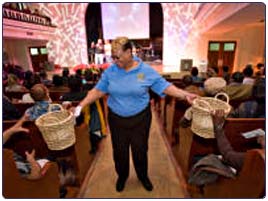Keeping the Faith Through a Financial Crisis
By Kristina Herrndobler and Jemimah Noonoo | Дек 27, 2008

Pastor Rudy Rasmus recently called the staff of St. John’s Methodist Church downtown together for a meeting. The news wasn’t good, and the timing couldn’t be worse.
Between Christmas and New Year’s Day, the staff of 40 will be reduced by 20 percent.
“It’s hard to hear that kind of news and feel holiday cheer,” said Rasmus, who knows the same gloomy financial news is reverberating throughout religious communities around the U.S.
Though they are the exception, not the rule, the Wall Street Journal recently reported that some churches are falling behind or defaulting on loans, others are filing for bankruptcy and one Anglican church in Easton, Md., recently was sold at an auction for $700,000.
While Houston and Galveston have been spared the worst of the economic downturn, local churches are hurting from a double punch — the sour economy and the recent hurricanes.
Philanthropic gifts at St. John’s are down 30 percent, Rasmus said. Now, he’s having to cut services and budgets at the same time Americans are searching for spiritual anchors.
“The opportunity for ministry only increases in this kind of economy,” said Phill Martin, spokesman for the National Association of Church Business Administration.
“Churches need to step up and do ministry in a new way.”
Local religious centers have responded by eliminating unfilled positions, recruiting volunteers to take on paid positions, reducing hours of operation to save energy costs and postponing building construction. For some local institutions, those drastic measures are not enough.
Declining numbers
Several Evangelical Lutheran churches in Galveston and Houston were struggling even before Hurricane Ike.
The Park Place Lutheran Church in Houston’s East End closed its doors in November 2007, and a For Sale sign was planted in the front lawn.
Financial problems contributed to the decision to close, said Bishop Mike Rinehart, with the Texas-Gulf Coast Synod, Evangelical Lutheran Church of America. The property was recently sold.
“Protestant churches in general are dealing with declining attendance,” Rinehart said. “The church has lost a lot of influence in the last few years, and that is the reality of it.”
At the Hare Krishna temple on 34th Street, a drop in donations, not attendance, has temporarily stopped construction on a new building.
Hansa Medley, the temple’s outreach director, said donations are down $200,000 — 22 percent — from November 2007 to November 2008. She’s hoping construction will resume in February.
The Rev. Ken Gurley of First Church of Pearland says his congregation has helped to pay mortgages for three other Pentecostal churches.
“The combined effects of Katrina, Rita and then Ike have really stretched church resources to the max,” Gurley said. “In all of these crises, churches literally emptied their pockets.”
George Barna, founder of a research firm that studies Americans’ religious habits and behavior, published a bleak report earlier this month about the impact of the economic downturn on churches.
During a telephone survey of 1,203 respondents nationwide, The Barna Group found that one out of five households had decreased its giving to churches or other religious centers. And among that group, 22 percent had stopped giving altogether.
“The patterns we’re witnessing suggest that churches will receive some $3 billion to $5 billion dollars less than expected during this fourth quarter,” Barna wrote in his report.
Some are optimistic
Despite the barrage of bad economic news, some clergy are hopeful that December will be a good month financially. It typically is, says Barna, who estimates that as much as one-third of a church’s annual revenue comes at the end of the year.
At Second Baptist Church, for example, as much as 25 percent of its revenue should be coming in about now. The Rev. Gary Moore, senior associate pastor, said income from year-end stock sales and bonuses typically drive increased giving. And some people increase their donations to take advantage of tax write-offs.
With the economy clearly on the minds of the givers and receivers, clergy have begun addressing the issue with their congregations.
The Rev. Gregg Matte with Houston’s First Baptist Church recently delivered a sermon titled, “Heaven is not in a Recession.”
“We do it backward,” Matte said.” We start enjoying, so we end up in debt. Then we can’t pay our bills, so who’s got money to save? ‘And now you want me to give? Come on! I’m tapped out.’ But that is because you are going in the wrong direction.”
Gary Ledbetter, spokesman for the Southern Baptists of Texas Convention, said religious leaders are being cautious with their 2009 budgets, as they should be.
“Churches are made up of people,” Ledbetter said. “Unless we share the same type of experience as our neighbor, how can they possibly think that our faith has any relevance?”
Chronicle reporter Barbara Karkabi contributed.















